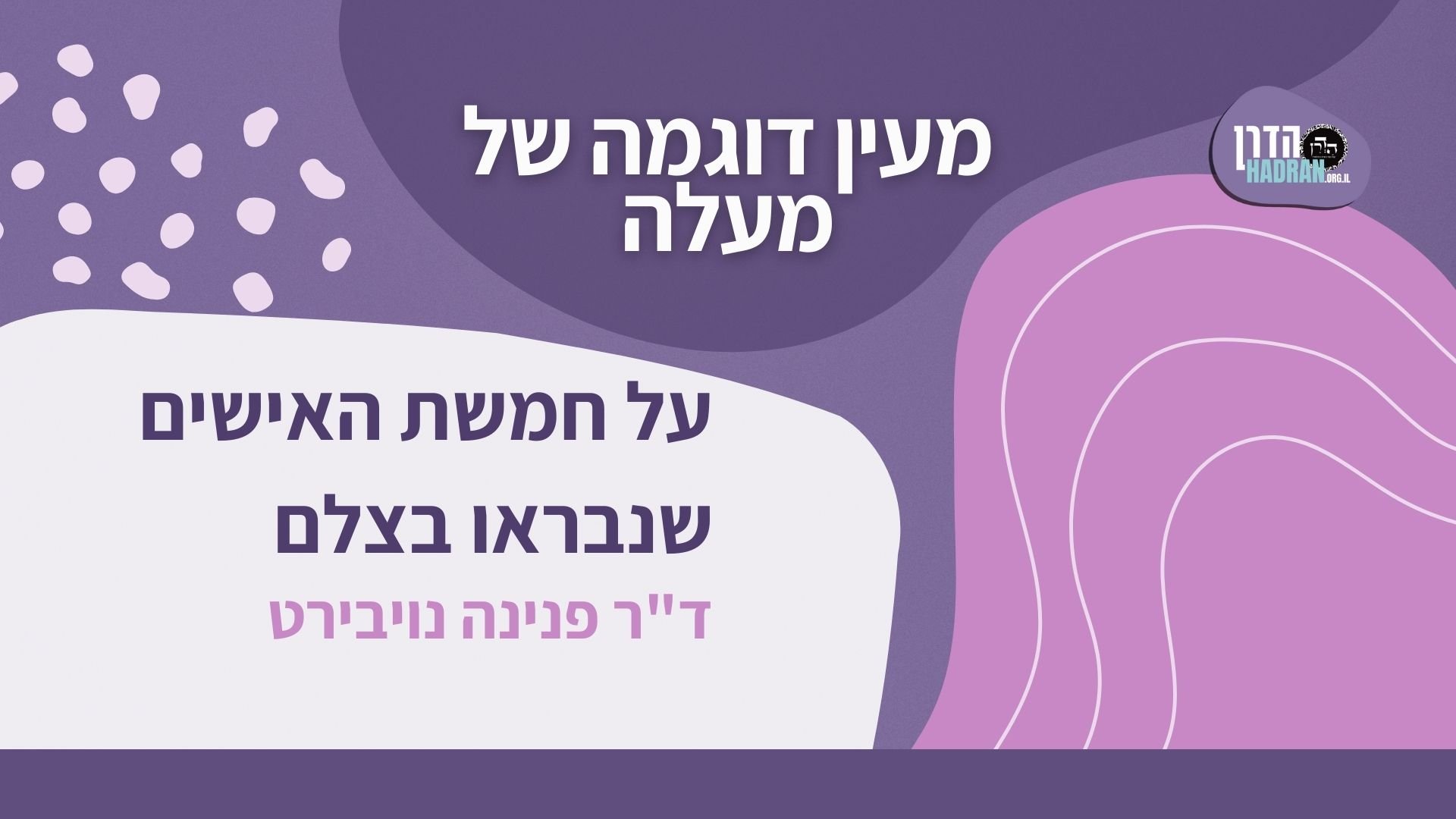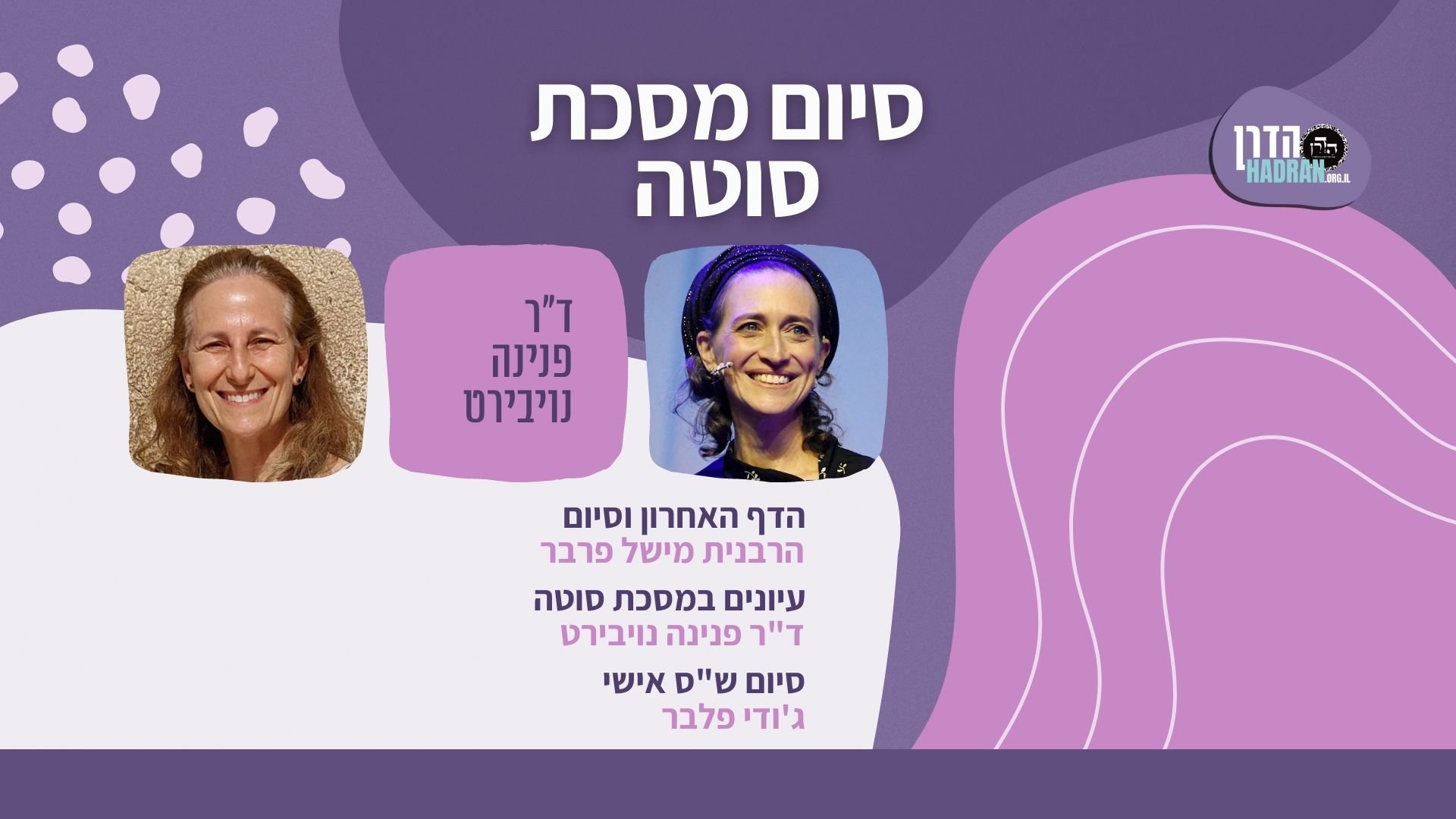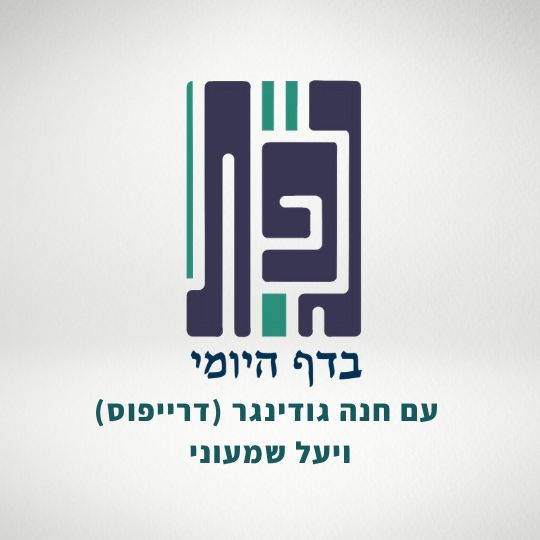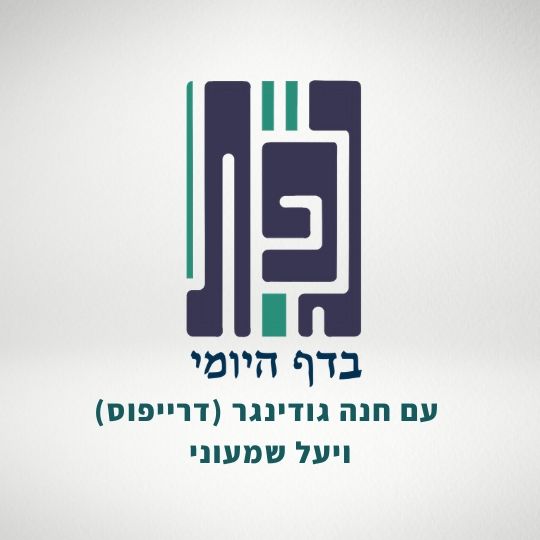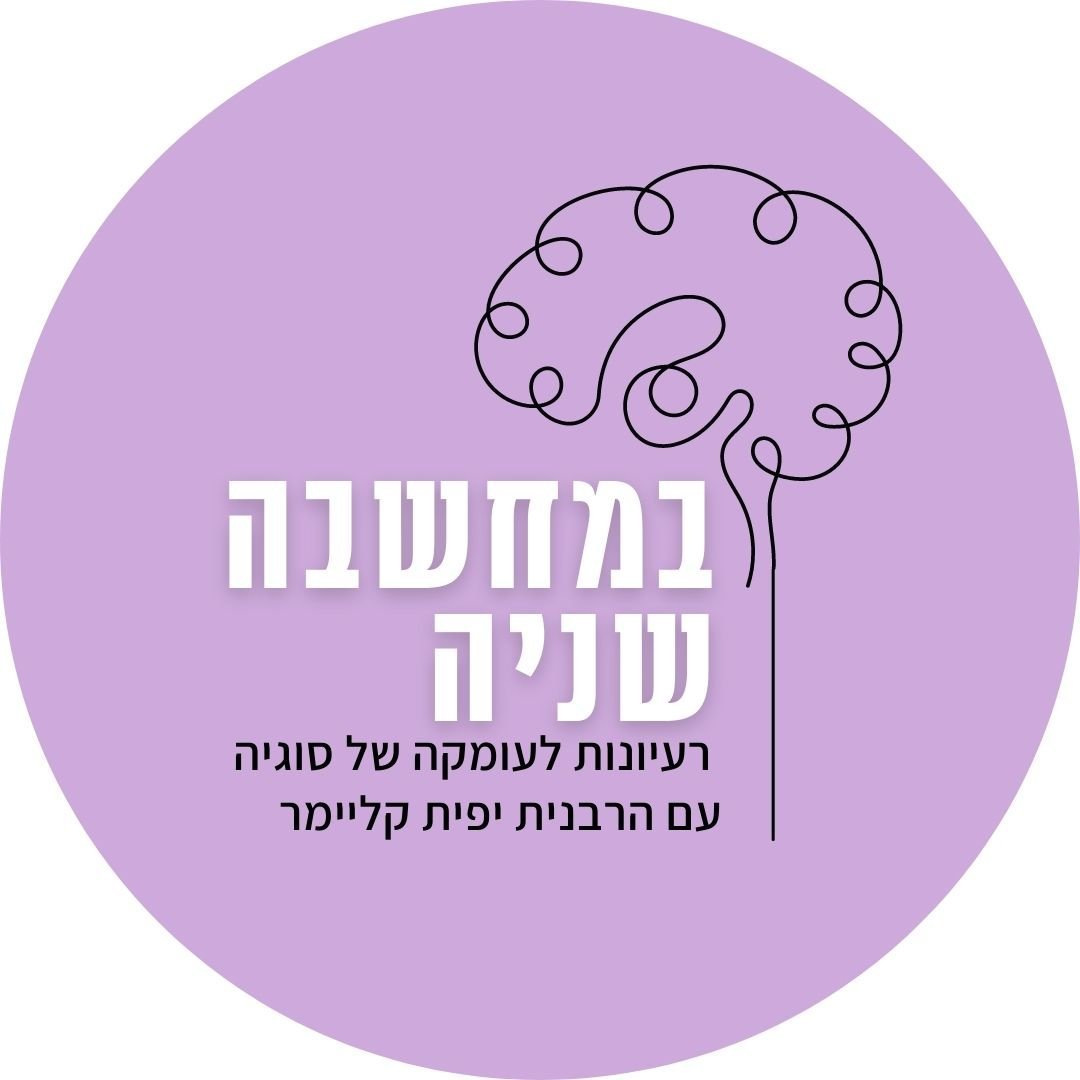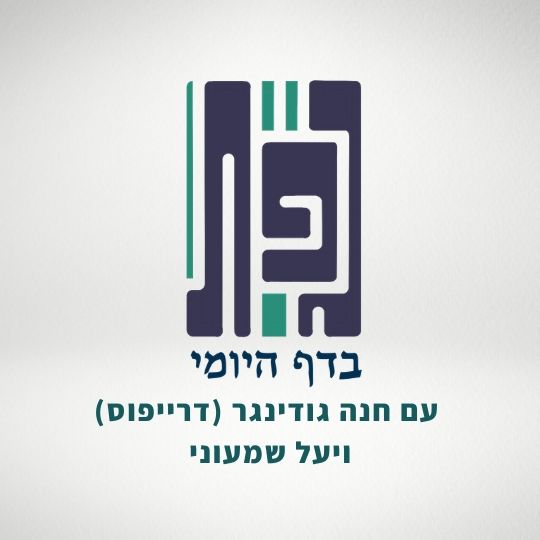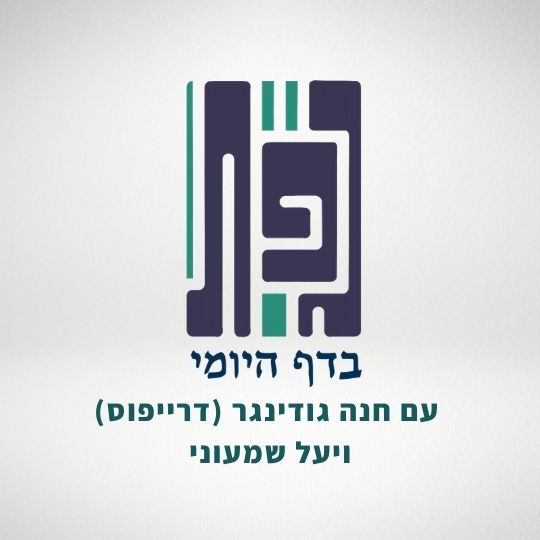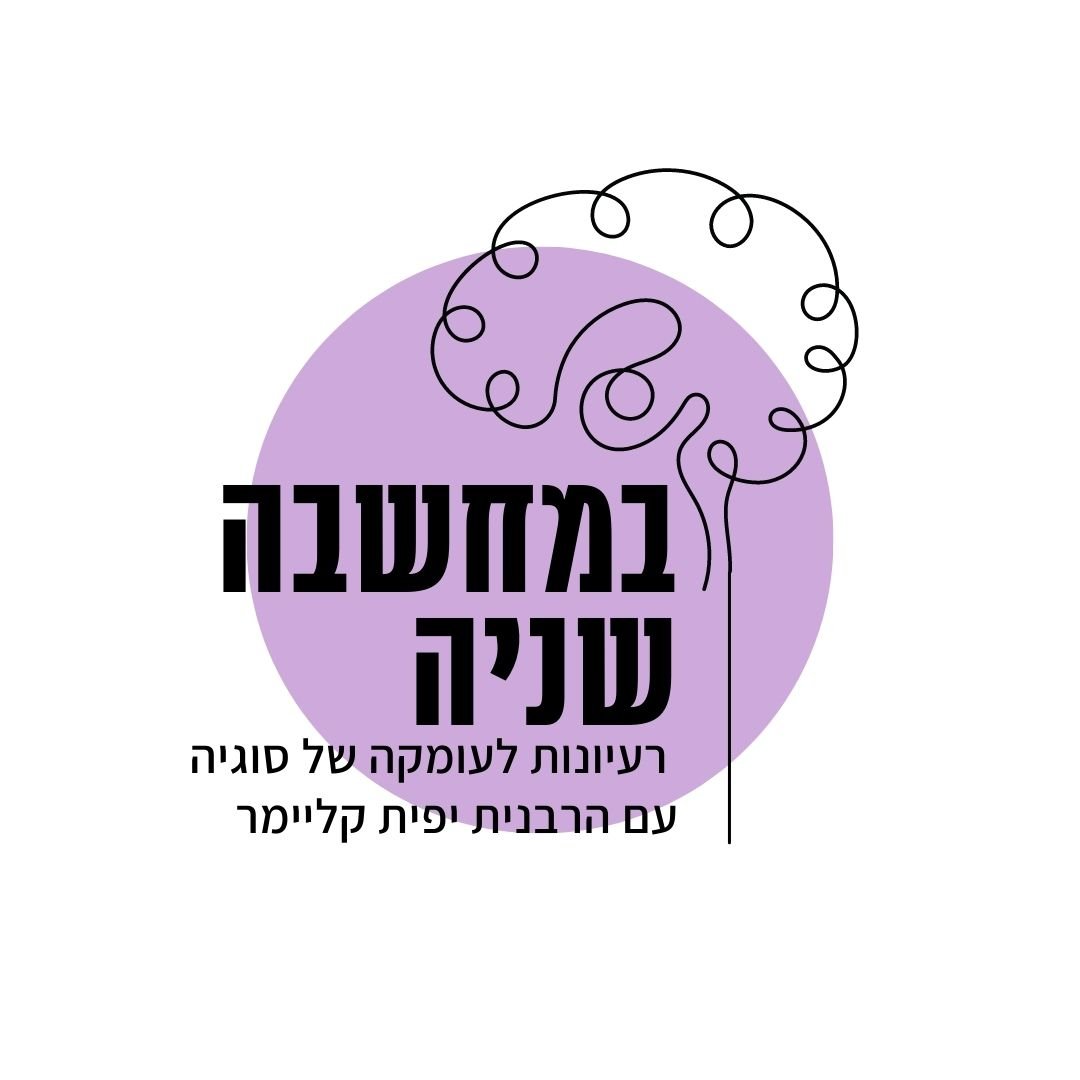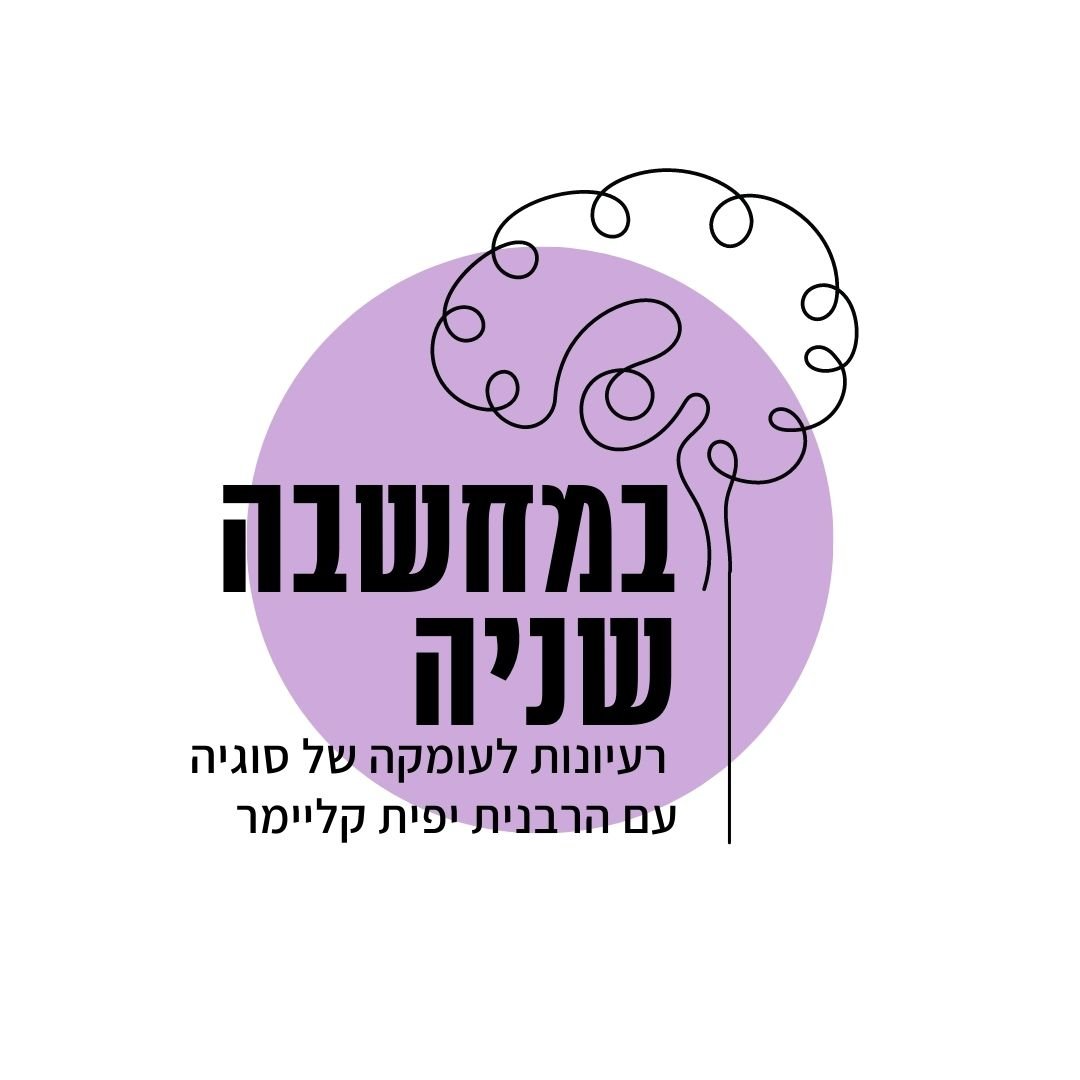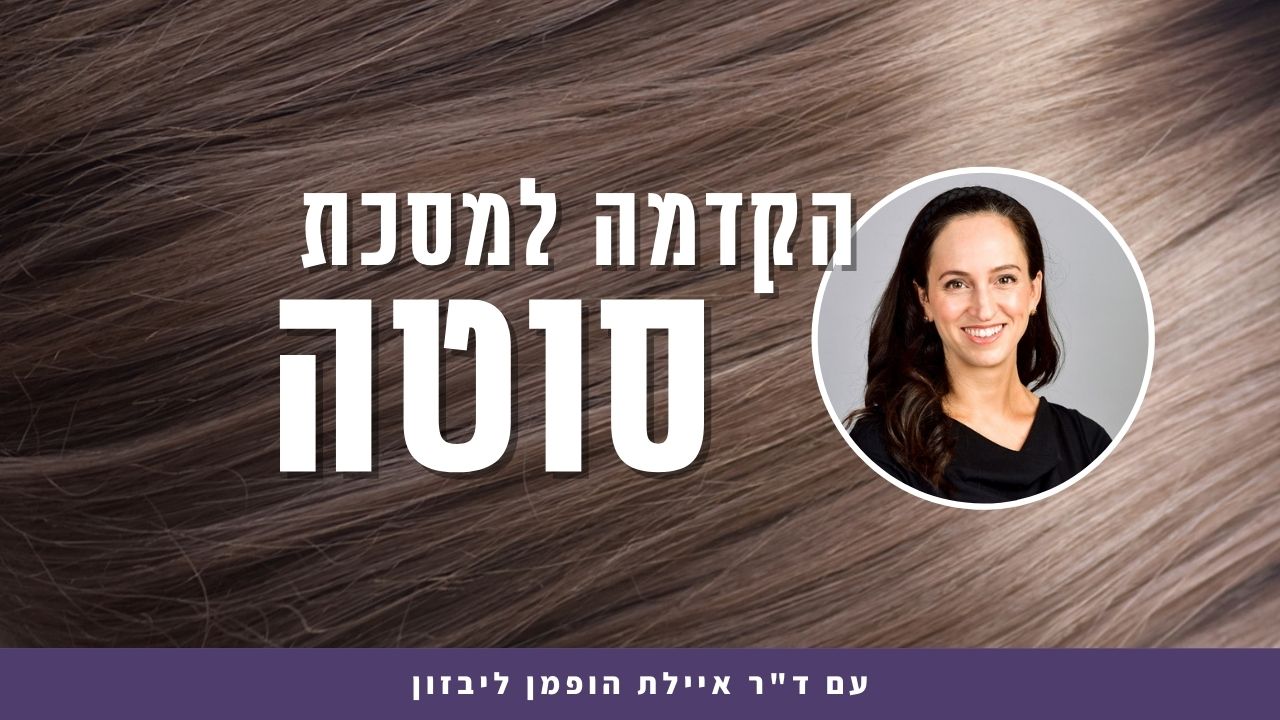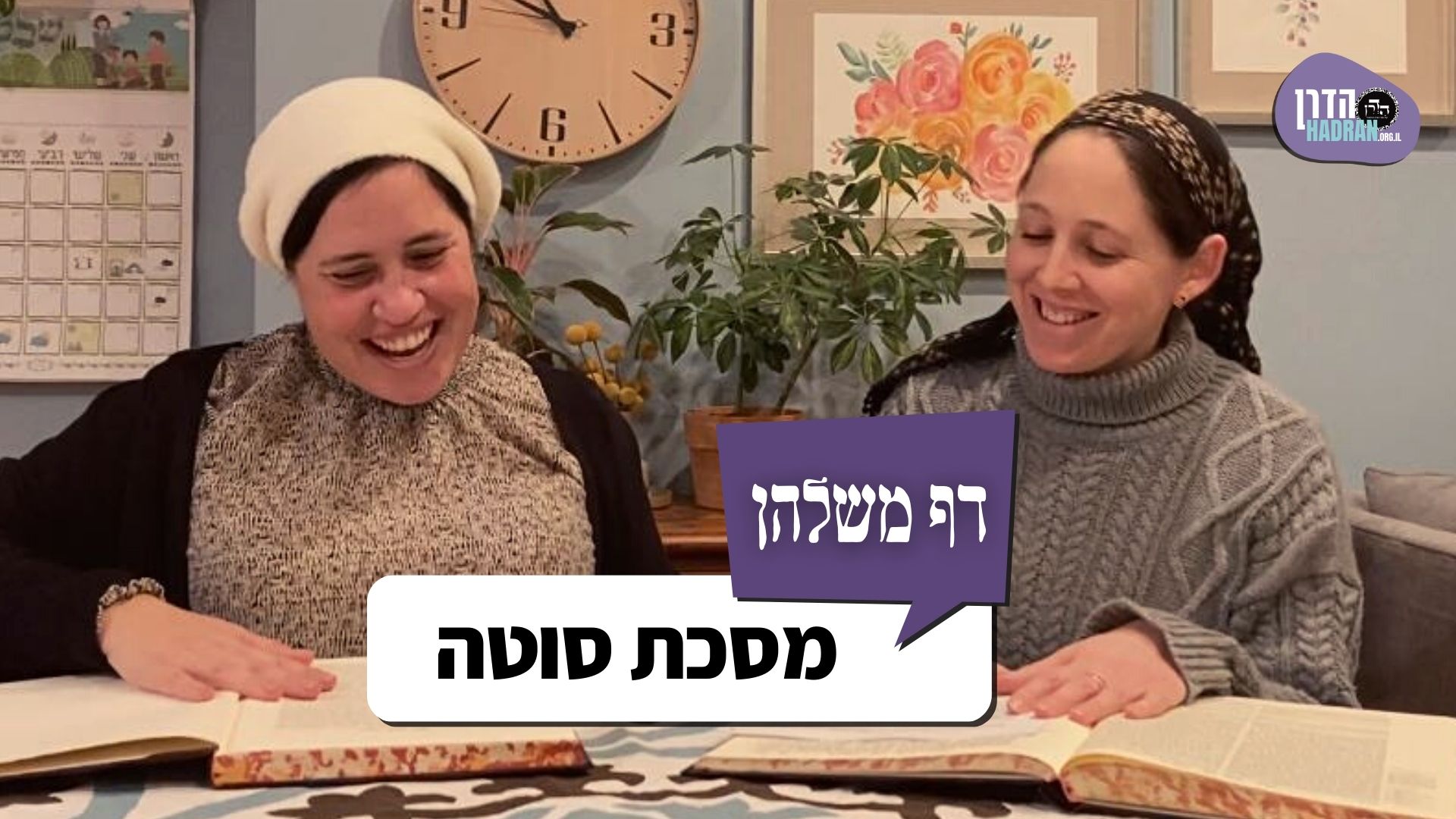אמר רבי יהושע במשנה, שכאשר נאמר "לו” בפסוק על איוב (איוב) כתיב בוי”ו ולא באל”ף ויבואר: לו אחכה במקום ולא אחכה. למה בכלל הייתה סיבה לחשוב שזה נכתב בוי”ו אבל נקרא באל”ף? מדוע סבר רבי יהושע שאיוב עובד את ה’ מתוך אהבה ולא מיראה? מה ההבדל בשכר בין מי שעובד את ה’ מאהבה או מיראה? מאיפה זה נדרש? ניתן להאמין עד אחד, אפילו אחד שבדרך כלל אינו מקובל בבית הדין, שהאשה קיימה יחסים עם הגבר כשנסתרה עמו בחדר (נטמאה) ועל פי דברים אלו, לא משקים את הסוטה. מדוע מאמינים לעד אחד? למה צריך שניים כדי להעיד שנסתרה? מה הדין אם הייתה עדות סותרת לגבי האם היא נטמאה או לא – באילו מקרים היא יכולה לשתות את המים ובאילו מקרים לא? איך זה מסתדר עם האמירה של עולא שבמקרים שבהם מאמינים לעד אחד, עד אחד נחשב כשניים? עולא ורבי חייא מתרצים את זה בדרכים אחרות ולכל אחד יש קריאה אחרת של המשנה.
רוצה להקדיש שיעור?
כלים
העמקה
רוצה להבין מה באמת קורה מתחת לפני השטח של הסוגיה?
שיעורים, פודקאסטים והרחבות של מיטב המורות שלנו יפתחו לך עוד זוויות וכיווני חשיבה.
חדשה בלימוד הגמרא?
זה הדף הראשון שלך? איזו התרגשות עצומה! יש לנו בדיוק את התכנים והכלים שיעזרו לך לעשות את הצעדים הראשונים ללמידה בקצב וברמה שלך, כך תוכלי להרגיש בנוח גם בתוך הסוגיות המורכבות ומאתגרות.
פסיפס הלומדות שלנו
גלי את קהילת הלומדות שלנו, מגוון נשים, רקעים וסיפורים. כולן חלק מתנועה ומסע מרגש ועוצמתי.
סוטה לא
״בְּמַקְהֵלוֹת בָּרְכוּ אֱלֹהִים ה׳ מִמְּקוֹר יִשְׂרָאֵל״.
“In full assemblies, bless God, the Lord, you that are from the source of Israel” (Psalms 68:27), indicating that even children that are in the “source,” i.e., their mother’s womb, blessed God when they gathered at the sea.
וְהָא לָא חֲזוֹ? אָמַר רַבִּי תַּנְחוּם: כָּרֵס נַעֲשָׂה לָהֶן כְּאַסְפַּקְלַרְיָא הַמְּאִירָה וְרָאוּ.
The Gemara asks: But the fetuses could not see, so how could they have honestly said: “This is my God and I will glorify him”? Rabbi Tanḥum says: Their mother’s stomach was transformed for them like luminous crystal [aspaklarya], and they saw through it.
בּוֹ בַּיּוֹם דָּרַשׁ רַבִּי יְהוֹשֻׁעַ בֶּן הוּרְקָנוֹס שֶׁלֹּא עָבַד אִיּוֹב כּוּ׳. וְלִיחְזֵי הַאי ״לֹא״, אִי בְּלָמֶד אָלֶף כְּתִיב — ״לֹא״ הוּא, אִי בְּלָמֶד וָיו כְּתִיב — ״לוֹ״ הוּא?
§ On that same day Rabbi Yehoshua ben Hyrcanus taught that Job served the Holy One, Blessed be He, only out of love, as it is stated: “Though He will slay me, still I will trust in Him [lo]” (Job 13:15). The mishna continues that the word lo in the verse is ambiguous as to whether it is indicative of Job expressing his yearning for God or his lack thereof. The Gemara asks: Let us see whether this word lo is written lamed alef, and therefore its meaning is: I will not trust, or whether it is written lamed vav, according to which its meaning is: I trust in Him. Why is there room for doubt with regard to the meaning of the verse?
וְכׇל הֵיכָא דִּכְתִיב בְּלָמֶד אָלֶף, ״לֹא״ הוּא? אֶלָּא מֵעַתָּה ״בְּכׇל צָרָתָם לֹא צָר״, דִּכְתִיב בְּלָמֶד אָלֶף, הָכִי נָמֵי דְּ״לֹא״ הוּא?
The Gemara counters: But is it true that anywhere that the word lo is written lamed alef, its meaning is: Not? If that is so, then in the verse: “In all their affliction He was [lo] afflicted” (Isaiah 63:9), where the word lo is written lamed alef, so too, does it mean: Not, i.e., God was not afflicted in the afflictions of the Jewish people?
וְכִי תֵּימָא הָכִי נָמֵי, וְהָכְתִיב ״וּמַלְאַךְ פָּנָיו הוֹשִׁיעָם״! אֶלָּא לָאו, מַשְׁמַע הָכִי וּמַשְׁמַע הָכִי.
And if you would say that indeed that is the meaning of the verse, but isn’t it written in the continuation of that same verse: “And the angel of His Presence saved them,” which clearly indicates that God was concerned with their afflictions? Evidently, the word lo in that verse means: “In all their affliction He was afflicted.” Rather, is it not clear that lamed alef sometimes indicates this and sometimes indicates that? Therefore, the mishna had to derive the proper meaning of the word from another verse.
תַּנְיָא, רַבִּי מֵאִיר אוֹמֵר: נֶאֱמַר ״יְרֵא אֱלֹהִים״ בְּאִיּוֹב, וְנֶאֱמַר ״יְרֵא אֱלֹהִים״ בְּאַבְרָהָם, מָה ״יְרֵא אֱלֹהִים״ הָאָמוּר בְּאַבְרָהָם — מֵאַהֲבָה, אַף ״יְרֵא אֱלֹהִים״ הָאָמוּר בְּאִיּוֹב — מֵאַהֲבָה.
It is taught in a baraita (Tosefta 6:1) that Rabbi Meir says: It is stated with regard to Job that he was “God-fearing” (Job 1:1), and it is stated with regard to Abraham that he was “God-fearing” (Genesis 22:12). Just as the description “God-fearing,” which is stated with regard to Abraham, is referring to Abraham’s fearing God out of love, so too, the description “God-fearing” that is stated with regard to Job indicates that Job feared God out of love.
וְאַבְרָהָם גּוּפֵיהּ מְנָלַן — דִּכְתִיב ״זֶרַע אַבְרָהָם אֹהֲבִי״.
The Gemara asks: And with regard to Abraham himself, from where do we derive that he acted out of a sense of love? As it is written: “The offspring of Abraham who loved Me” (Isaiah 41:8).
מַאי אִיכָּא בֵּין עוֹשֶׂה מֵאַהֲבָה לְעוֹשֶׂה מִיִּרְאָה? אִיכָּא הָא דְּתַנְיָא, רַבִּי שִׁמְעוֹן בֶּן אֶלְעָזָר אוֹמֵר: גָּדוֹל הָעוֹשֶׂה מֵאַהֲבָה יוֹתֵר מִן הָעוֹשֶׂה מִיִּרְאָה, שֶׁזֶּה תָּלוּי לְאֶלֶף דּוֹר. וְזֶה תָּלוּי לְאַלְפַּיִם דּוֹר.
The Gemara asks: What difference is there between one who performs mitzvot out of love and one who performs mitzvot out of fear? The Gemara answers: There is that which is taught in a baraita that Rabbi Shimon ben Elazar says: Greater is the one who performs mitzvot out of love than the one who performs mitzvot out of fear, as with regard to this one who acts out of fear, his merits endure for one thousand generations, and with regard to that one who serves God out of love, his merits endure for two thousand generations.
הָכָא כְּתִיב: ״לַאֲלָפִים לְאֹהֲבַי וּלְשֹׁמְרֵי מִצְוֹתָי״, וְהָתָם כְּתִיב: ״וּלְשֹׁמְרֵי מִצְוֹתָיו לְאֶלֶף דּוֹר״.
Proof of this assertion is that here it is written: “And showing mercy unto thousands of generations of those who love Me and keep My commandments” (Exodus 20:5), indicating that merits can last for thousands of generations for those who act out of love, and there it is written: “Know therefore that the Lord your God, He is God; the faithful God, Who keeps the covenant and mercy with those who love Him and keep His commandments for a thousand generations” (Deuteronomy 7:9). The first verse indicates that those who act out of love retain their merits for thousands of generations, whereas the second verse, which mentions only one thousand generations of merit, is referring to the merits of those who keep God’s mitzvot out of fear.
הָתָם נָמֵי כְּתִיב ״לְאֹהֲבָיו וּלְשֹׁמְרֵי מִצְוֹתָיו לְאֶלֶף דּוֹר״!
The Gemara asks: But there also, in the second verse, it is written: “The faithful God, Who keeps the covenant and mercy with those who love Him and keep His commandments for a thousand generations” (Deuteronomy 7:9). Why is the verse interpreted specifically with regard to those who worship God out of fear, yet it is written that they keep His mitzvot out of love? Both types of people seem to be indicated in both verses.
הַאי לְדִסְמִיךְ לֵיהּ וְהַאי לְדִסְמִיךְ לֵיהּ.
The Gemara answers: That verse, which mentions one thousand generations, is understood as referring to that which is adjacent to it. The phrase “for a thousand generations” is understood as referring those who perform mitzvot out of fear, as it is written immediately preceding the phrase “and keep His commandments,” which does not mention love. And this verse, which mentions thousands of generations, is understood as referring to that which is adjacent to it: “Unto thousands of generations of those who love Me.”
הָנְהוּ תְּרֵי תַּלְמִידֵי דַּהֲווֹ יָתְבִי קַמֵּיהּ דְּרָבָא, חַד אָמַר לֵיהּ אַקְרְיוּן בְּחֶלְמַאי: ״מָה רַב טוּבְךָ אֲשֶׁר צָפַנְתָּ לִּירֵאֶיךָ״, וְחַד אָמַר לֵיהּ: אַקְרְיוּן בְּחֶלְמַאי ״וְיִשְׂמְחוּ כׇל חוֹסֵי בָךְ לְעוֹלָם יְרַנֵּנוּ וְיַעְלְצוּ בְךָ אֹהֲבֵי שְׁמֶךָ״. אֲמַר לְהוּ: תַּרְוַיְיכוּ רַבָּנַן צַדִּיקֵי גְּמוּרֵי אַתּוּן. מָר מֵאַהֲבָה, וּמָר מִיִּרְאָה.
It happened that there were these two students who were sitting before Rava, and one said to him: It was read to me in my dream: “How abundant is Your goodness, which You have laid up for those who fear You” (Psalms 31:20). And one said to Rava: It was read to me in my dream: “So shall all those who take refuge in You rejoice; they will forever shout for joy, and You will shelter them; let them also who love Your name exult in You” (Psalms 5:12). Rava said to them: You are both completely righteous Sages. One Sage, the second dreamer, serves God out of love, and one Sage, the first dreamer, serves God out of fear. Each Sage’s dream corresponded to his manner of serving God.
הֲדַרַן עֲלָךְ כְּשֵׁם שֶׁהַמַּיִם
מִי שֶׁקִּינֵּא לְאִשְׁתּוֹ וְנִסְתְּרָה, אֲפִילּוּ שָׁמַע מֵעוֹף הַפּוֹרֵחַ — יוֹצִיא וְיִתֵּן כְּתוּבָּה, דִּבְרֵי רַבִּי אֱלִיעֶזֶר.
MISHNA: In the case of one who warned his wife not to seclude herself with a particular man and she subsequently secluded herself with the man she was warned about, even if he heard about it from a flying bird, or any other source whatsoever, he must divorce his wife. However, he must still grant her the money accorded to her by her marriage contract because there is no actual proof of her seclusion with the man in question. This is the statement of Rabbi Eliezer, who, as quoted in the first mishna of the tractate (2a), holds that there is no necessity for witnesses to testify with regard to the seclusion, and the woman becomes forbidden to her husband even in the absence of witnesses, by the husband’s word alone.
רַבִּי יְהוֹשֻׁעַ אוֹמֵר: עַד שֶׁיִּשְׂאוּ וְיִתְּנוּ בָּהּ מוֹזְרוֹת בַּלְּבָנָה.
Rabbi Yehoshua disagrees, as he did in the mishna (2a), and says: He does not divorce his wife in the absence of witnesses until the gossiping women who sit and spin thread by the light of the moon begin to discuss her behavior, as they share the gossip of the town. The Gemara earlier (6b) taught that a woman whose infidelity became subject to this public discussion can no longer be tested by the bitter water of a sota. Consequently, she must get divorced.
אָמַר עֵד אֶחָד ״אֲנִי רְאִיתִיהָ שֶׁנִּטְמֵאת״ — לֹא הָיְתָה שׁוֹתָה. וְלֹא עוֹד, אֶלָּא אֲפִילּוּ עֶבֶד אֲפִילּוּ שִׁפְחָה — הֲרֵי אֵלּוּ נֶאֱמָנִין אַף לְפוֹסְלָהּ מִכְּתוּבָּתָהּ.
The mishna continues to list various possible testimonies concerning such acts of seclusion. If one witness said: I saw that she became defiled during her seclusion by engaging in sexual intercourse with that other man, she does not drink the bitter water, but rather, he divorces her immediately. And furthermore, even if the one who testified was a slave or a maidservant, neither of whom is generally regarded as a valid witness, they are deemed credible to testify to the wife’s adultery even to the extent that their testimony disqualifies her from receiving her marriage contract and prevents her from drinking the bitter water.
חֲמוֹתָהּ וּבַת חֲמוֹתָהּ וְצָרָתָהּ וִיבִמְתָּהּ וּבַת בַּעְלָהּ — הֲרֵי אֵלּוּ נֶאֱמָנוֹת. וְלֹא לְפוֹסְלָהּ מִכְּתוּבָּתָהּ, אֶלָּא שֶׁלֹּא תִּשְׁתֶּה.
The mishna continues by listing women whose testimony is only partially accepted concerning this matter: Her mother-in-law, and her mother in-law’s daughter, and her rival wife, i.e., a second wife of the husband, and her yevama, i.e., her husband’s brother’s wife, and her husband’s daughter, all of whom are generally not deemed credible if they say anything incriminating pertaining to this woman due to the tumultuous relationships these women often have. They are all deemed credible to testify concerning the woman’s defilement while in seclusion, but are not deemed credible to the extent that their testimony will disqualify her from receiving her marriage contract; rather, it is deemed credible to the extent that she will not drink of the bitter water of a sota.
שֶׁהָיָה בַּדִּין: וּמָה אִם עֵדוּת רִאשׁוֹנָה, שֶׁאֵין אוֹסַרְתָּהּ אִיסּוּר עוֹלָם — אֵינָהּ מִתְקַיֶּימֶת בְּפָחוֹת מִשְּׁנַיִם, עֵדוּת אַחֲרוֹנָה, שֶׁאוֹסַרְתָּהּ אִיסּוּר עוֹלָם — אֵינוֹ דִּין שֶׁלֹּא תִּתְקַיֵּים בְּפָחוֹת מִשְּׁנַיִם?
This ruling allowing one witness’s testimony with regard to defilement needs to be stated, as, by right, it should not have been deemed credible based on the following a fortiori inference: And just as if with regard to the first testimony concerning seclusion, which does not forbid her with an irrevocable prohibition, as the woman can be found innocent permitting her again to her husband by drinking the bitter water, is not established with fewer than two witnesses, since according to the mishna the testimony of seclusion requires two witnesses, then with regard to the final testimony concerning defilement, which forbids her to her husband with an irrevocable prohibition, is it not logical that it should also not be established with fewer than two witnesses?
תַּלְמוּד לוֹמַר: ״וְעֵד אֵין בָּהּ״, כׇּל עֵדוּת שֶׁיֵּשׁ בָּהּ.
Therefore, to counter this derivation, the verse states: “And there be no witness against her” (Numbers 5:13), teaching that any testimony with regard to defilement that there is against her is sufficient, and two witnesses are not required.
וְקַל וָחוֹמֶר לְעֵדוּת הָרִאשׁוֹנָה מֵעַתָּה: וּמָה אִם
The Mishnah asks: And from now that it is established that one witness suffices to testify with regard to defilement, an a fortiori inference can be made with regard to the first testimony of seclusion: And just as if
עֵדוּת אַחֲרוֹנָה שֶׁאוֹסַרְתָּהּ אִיסּוּר עוֹלָם — הֲרֵי הִיא מִתְקַיֶּימֶת בְּעֵד אֶחָד, עֵדוּת הָרִאשׁוֹנָה שֶׁאֵין אוֹסַרְתָּהּ אִיסּוּר עוֹלָם — אֵינוֹ דִּין שֶׁתִּתְקַיֵּים בְּעֵד אֶחָד?
concerning the final testimony of defilement, which forbids her with an irrevocable prohibition, yet it is established by one witness, then with regard to the first testimony, which does not forbid her with an irrevocable prohibition, is it not logical that it should be established with only one witness?
תַּלְמוּד לוֹמַר: ״כִּי מָצָא בָהּ עֶרְוַת דָּבָר״, וּלְהַלָּן הוּא אוֹמֵר: ״עַל פִּי שְׁנֵי עֵדִים … יָקוּם דָּבָר״, מָה לְהַלָּן עַל פִּי שְׁנַיִם — אַף כָּאן פִּי שְׁנַיִם.
Therefore, to counter this derivation, the verse states: “When a man takes a wife, and marries her, and it comes to pass, if she finds no favor in his eyes, because he has found some unseemly matter [davar] in her” (Deuteronomy 24:1), and there, in the laws concerning monetary matters, it states: “At the mouth of two witnesses, or at the mouth of three witnesses, shall a matter [davar] be established” (Deuteronomy 19:15), teaching that just as the “matter” stated there is established “at the mouth of two witnesses,” so too, here the “matter” of her seclusion must be established “at the mouth of two witnesses.”
עֵד אוֹמֵר ״נִטְמֵאת״ וְעֵד אוֹמֵר ״לֹא נִטְמֵאת״, אִשָּׁה אוֹמֶרֶת ״נִטְמֵאת״ וְאִשָּׁה אוֹמֶרֶת ״לֹא נִטְמֵאת״ — הָיְתָה שׁוֹתָה.
The mishna discusses the halakha in a case where two single witnesses contradict each other concerning her defilement. If one witness says: She was defiled, and another witness says: She was not defiled, or similarly in the case of those normally disqualified from bearing witness, if one woman says: She was defiled, and another woman says: She was not defiled, she would drink the bitter water of a sota, due to the uncertainty engendered by the contradictory testimonies.
אֶחָד אוֹמֵר ״נִטְמֵאת״ וּשְׁנַיִם אוֹמְרִים ״לֹא נִטְמֵאת״ — הָיְתָה שׁוֹתָה. שְׁנַיִם אוֹמְרִים ״נִטְמֵאת״ וְאֶחָד אוֹמֵר ״לֹא נִטְמֵאת״ — לֹא הָיְתָה שׁוֹתָה.
Similarly, if one witness says: She was defiled, and two witnesses say: She was not defiled, she would drink the bitter water. However, if two would say: She was defiled, and one says: She was not defiled, the testimony of the two witnesses is accepted and she would not drink the bitter water, and the husband must divorce her.
גְּמָ׳ הַאי תַּלְמוּד לוֹמַר ״כִּי מָצָא בָהּ עֶרְוַת דָּבָר״,
GEMARA: The Gemara questions why the mishna proves the need for two witnesses to testify about the seclusion based upon the verbal analogy of “matter” and “matter,” if there is an explicit source in the Torah stating that two witnesses are required. This reason is given by the mishna: The verse states: “When a man takes a wife, and marries her, and it comes to pass, if she finds no favor in his eyes, because he has found some unseemly matter [davar] in her” (Deuteronomy 24:1), which through a verbal analogy based on the word “davar” teaches the need for two witnesses, seems to be superfluous.
תַּלְמוּד לוֹמַר ״בָּהּ״ — בָּהּ וְלֹא בְּקִינּוּי, בָּהּ וְלֹא בִּסְתִירָה מִיבְּעֵי לֵיהּ!
As, the mishna should have said in its place: The verse states: “She was defiled secretly and there was no witness [ed] against her [bah]” (Numbers 5:13), which is explained to mean there were not two witnesses, but only one, who testified concerning her defilement. One can infer from the term “bah,” which could also be understood as: With regard to it, that in this matter of defilement one witness suffices, but not with regard to the warning. Additionally, one can infer: With regard to it, but not with regard to the seclusion. Therefore, there must be two witnesses to testify about both the warning and seclusion.
הָכִי נָמֵי קָאָמַר: תַּלְמוּד לוֹמַר ״בָּהּ״ — בָּהּ וְלֹא בְּקִינּוּי, בָּהּ וְלֹא בִּסְתִירָה.
The Gemara answers: That is also what the tanna of the mishna is saying. The source for the halakha that there is a requirement for two witnesses to testify about the seclusion is that the verse states: With regard to it, that in this matter of defilement one witness suffices, but not with regard to the warning. With regard to it, but not with regard to the seclusion.
וְטוּמְאָה בְּעָלְמָא בְּלֹא קִינּוּי וּבְלֹא סְתִירָה, דְּלָא מְהֵימַן עֵד אֶחָד מְנָלַן? נֶאֱמַר כָּאן ״דָּבָר״, וְנֶאֱמַר לְהַלָּן ״דָּבָר״. מָה לְהַלָּן בִּשְׁנֵי עֵדִים — אַף כָּאן בִּשְׁנֵי עֵדִים.
The Gemara continues to explain the mishna: And concerning an ordinary accusation of defilement without a previous warning and without an act of seclusion with another man, from where do we derive that a single witness is not deemed credible? It is for this halakha that the mishna cites the verbal analogy: It is stated here: “Because he has found some unseemly matter [davar] in her” (Deuteronomy 24:1), and it is stated there concerning monetary matters: “At the mouth of two witnesses, or at the mouth of three witnesses, shall a matter [davar] be established” (Deuteronomy 19:15). Just as the “matter” stated there with regard to monetary matters is clarified specifically by the testimony of two witnesses, so too, here with regard to adultery the “matter” of her defilement must be established by the testimony of at least two witnesses.
עֵד אוֹמֵר נִטְמֵאת. טַעְמָא דְּקָא מַכְחֵישׁ לֵיהּ, הָא לָא קָא מַכְחֵישׁ לֵיהּ — עֵד אֶחָד מְהֵימַן,
§ The mishna taught: If one witness says: She was defiled, and another witness says: She was not defiled, she drinks the bitter water of a sota. The Gemara infers from this statement in the mishna that the reason the woman would drink the bitter water in this case is specifically because the second witness refutes his testimony, but if a second witness did not refute his testimony, then a single witness would be relied upon in this case and the woman would be forbidden to her husband forever.
מְנָהָנֵי מִילֵּי? דְּתָנוּ רַבָּנַן: ״וְעֵד אֵין בָּהּ״ — בִּשְׁנַיִם הַכָּתוּב מְדַבֵּר.
From where are these matters derived? As the Sages taught in reference to the verse describing the circumstances in which a woman defiled through an act of adultery becomes prohibited to her husband, which states: “And a man lie with her carnally…and there be no witness [ed] against her” (Numbers 5:13); the verse is speaking of a lack of two witnesses. When the verse refers to the lack of an ed, written in the singular, it actually indicates that there are not two witnesses against her, but only one, as the baraita will now explain.
אַתָּה אוֹמֵר בִּשְׁנַיִם, אוֹ אֵינוֹ אֶלָּא בְּאֶחָד — תַּלְמוּד לוֹמַר: ״לֹא יָקוּם עֵד אֶחָד בְּאִישׁ וְגוֹ׳״.
The baraita continues and asks: Do you say that the verse refers only to a case where there was not even one witness to the act of sexual intercourse, as the singular usage of the word ed would seem to indicate? The baraita now proves that the singular usage notwithstanding, elsewhere the word ed is used to indicate two witnesses, as the verse states: “One witness [ed] shall not rise up against a man for any iniquity or any sin that he sins; at the mouth of two witnesses, or at the mouth of three witnesses, shall a matter be established” (Deuteronomy 19:15).
מִמַּשְׁמַע שֶׁנֶּאֱמַר ״לֹא יָקוּם עֵד״, אֵינִי יוֹדֵעַ שֶׁהוּא אֶחָד, מָה תַּלְמוּד לוֹמַר ״אֶחָד״ — זֶה בָּנָה אָב: כׇּל מָקוֹם שֶׁנֶּאֱמַר ״עֵד״ — הֲרֵי כָּאן שְׁנַיִם, עַד שֶׁיִּפְרוֹט לְךָ הַכָּתוּב ״אֶחָד״.
The baraita infers a general principle from this verse by asking: By inference from that which is stated in the verse, even with the omission of the word “one”: “A witness shall not rise up against a man” (Deuteronomy 19:15), do I not know that it is referring to one witness, as the verse is written in the singular form? What is the meaning when the verse states explicitly: “One witness,” being that it is obviously referring to only one witness? The baraita answers: This established a paradigm for the principle that every place where the word “witness [ed]” is stated in the Torah without specifying a number, there are two witnesses here, until the verse specifies that it is referring to only one witness, by writing the word “one.”
וְאָמַר רַחֲמָנָא: תְּרֵי לֵית בַּהּ אֶלָּא חַד, ״וְהִיא לֹא נִתְפָּשָׂה״ — אֲסוּרָה.
The baraita returns to discuss the verse concerning a sota. And the Merciful One states: “There was no witness [ed] against her,” which therefore means that: There are not two witnesses to the sexual intercourse that could testify with regard to her, rather there is only one witness. The baraita completes its interpretation: Further in the verse it states: “And she was not taken in the act” (Numbers 5:13), indicating that the verse is referring to a case in which it is known that the woman had not been raped. This knowledge is based on the testimony of only one witness, as the verse had already stated that there were not two witnesses, and since one witness saw her willingly engage in sexual intercourse with another man, she is forbidden to her husband.
וְכֵיוָן דְּמִדְּאוֹרָיְיתָא עֵד אֶחָד מְהֵימַן, אִידַּךְ הֵיכִי מָצֵי מַכְחֵישׁ לֵיהּ? וְהָא אָמַר עוּלָּא: כׇּל מָקוֹם שֶׁהֶאֱמִינָה תּוֹרָה עֵד אֶחָד, הֲרֵי כָּאן שְׁנַיִם, וְאֵין דְּבָרָיו שֶׁל אֶחָד בִּמְקוֹם שְׁנַיִם!
The Gemara asks: But since the baraita taught that by Torah law one witness is deemed credible to state that the woman is defiled, how can the other witness who denies the wife’s infidelity refute him with his conflicting testimony and enable the woman to drink the bitter water instead of becoming forbidden outright to her husband? But doesn’t Ulla say: Wherever the Torah relies on one witness, there is the equivalent of the testimony of two witnesses here. Consequently, the testimony of the contradicting witness should be insignificant, as the statement of one witness has no standing in a place where it is contradicted by two witnesses, for the witness testifying about her infidelity is deemed credible as if two witnesses had testified.
אֶלָּא אָמַר עוּלָּא, תְּנִי: לֹא הָיְתָה שׁוֹתָה. וְכֵן אָמַר רַבִּי יִצְחָק: לֹא הָיְתָה שׁוֹתָה. וְרַבִּי חִיָּיא אָמַר: הָיְתָה שׁוֹתָה.
Rather, Ulla said: Teach the mishna in the following way: If one witness says: She was defiled, and another witness says: She was not defiled, she would not drink the bitter water. And likewise, Rabbi Yitzḥak said: She would not drink. But Rabbi Ḥiyya says in line with the standard text of the mishna: She would drink the bitter water even in the case of a contradiction between two single witnesses with regard to her infidelity.
לְרַבִּי חִיָּיא קַשְׁיָא דְּעוּלָּא. לָא קַשְׁיָא: כָּאן בְּבַת אַחַת. כָּאן בְּזֶה אַחַר זֶה.
The Gemara asks: But for Rabbi Ḥiyya, how will he respond to the same difficulty due to the teaching of Ulla, who explained that when a single witness is deemed credible he is considered as two and cannot be contradicted by a single witness to the contrary? The Gemara answers: This is not difficult: Here, the mishna is discussing a case where both witnesses arrived in court and testified simultaneously, thereby canceling each other out. But there, Ulla’s principle, that whenever a single witness’s testimony is accepted it is considered as two and cannot be contradicted by a single witness testifying to the contrary, is referring to a case in which the two conflicting witnesses came to court and testified one after the other.
תְּנַן: עֵד אוֹמֵר ״נִטְמֵאת״ וּשְׁנַיִם אוֹמְרִים ״לֹא נִטְמֵאת״ — הָיְתָה שׁוֹתָה. הָא חַד וְחַד — לֹא הָיְתָה שׁוֹתָה, תְּיוּבְתָּא דְּרַבִּי חִיָּיא!
But we learned in the mishna above that if one witness says: She was defiled, and two say: She was not defiled, she would drink the bitter water. The Gemara deduces from here: The implications of this statement are that the woman drinks only because the testimony of the incriminating witness was contradicted by two witnesses, but if there was one witness saying she was defiled and only one witness saying the opposite, she would not drink; this is a conclusive refutation of the opinion of Rabbi Ḥiyya.
אָמַר לָךְ רַבִּי חִיָּיא: וְלִיטַעְמָיךְ, אֵימָא סֵיפָא: שְׁנַיִם אוֹמְרִים ״נִטְמֵאת״ וְאֶחָד אוֹמֵר ״לֹא נִטְמֵאת״ — לֹא הָיְתָה שׁוֹתָה. הָא חַד וְחַד — הָיְתָה שׁוֹתָה.
The Gemara answers: Rabbi Ḥiyya could have said to you: And according to your reasoning that she would not drink, say the latter clause of the mishna, which states: If two witnesses say: She was defiled, and one says: She was not defiled, the testimony of the two witnesses is accepted and she would not drink the bitter water. But you should deduce from here that if there was one witness testifying to her defilement and one witness stating the opposite, she would drink the bitter water. This inference is in line with Rabbi Ḥiyya’s explanation, and contradicts the inference from the previous clause.
אֶלָּא, כּוּלַּהּ בִּפְסוּלֵי עֵדוּת, וְרַבִּי נְחֶמְיָה הִיא. דְּתַנְיָא, רַבִּי נְחֶמְיָה אוֹמֵר: כׇּל מָקוֹם שֶׁהֶאֱמִינָה תּוֹרָה עֵד אֶחָד — הַלֵּךְ אַחַר רוֹב דֵּעוֹת, וְעָשׂוּ שְׁתֵּי נָשִׁים בְּאִישׁ אֶחָד כִּשְׁנֵי אֲנָשִׁים בְּאִישׁ אֶחָד.
The Gemara explains: Rather, the correct understanding is that the entire mishna is not dealing with valid witnesses, and stating an obvious halakha in order to enable an inference, but with people who are disqualified from giving testimony, and is teaching us a novel ruling. And the mishna is in accordance with the opinion of Rabbi Neḥemya. As it is taught in a baraita (Tosefta Yevamot 14:1) that Rabbi Neḥemya says: Wherever the Torah relies on one witness, follow the majority of opinions. In other words, if the testimonies of two disqualified witnesses conflict, the court rules in accordance with the version supported by more witnesses, whether or not they are qualified to testify. And the Sages established that the testimony of two women, who are usually disqualified from testifying, when they testify in opposition to one man, should be like that of two men against one man, and the court will rule in accordance with the testimony of the two women.
וְאִיכָּא דְאָמְרִי: כׇּל הֵיכָא דַּאֲתָא עֵד אֶחָד כָּשֵׁר מֵעִיקָּרָא — אֲפִילּוּ מֵאָה נָשִׁים נָמֵי כְּעֵד אֶחָד דָּמְיָין.
And some say that Rabbi Neḥemya actually stated something different: And there are those who say a different version of Rabbi Neḥemya’s approach: Anywhere that one valid witness came initially, even one hundred women who later contradict him are considered like one witness, and do not override his testimony.

